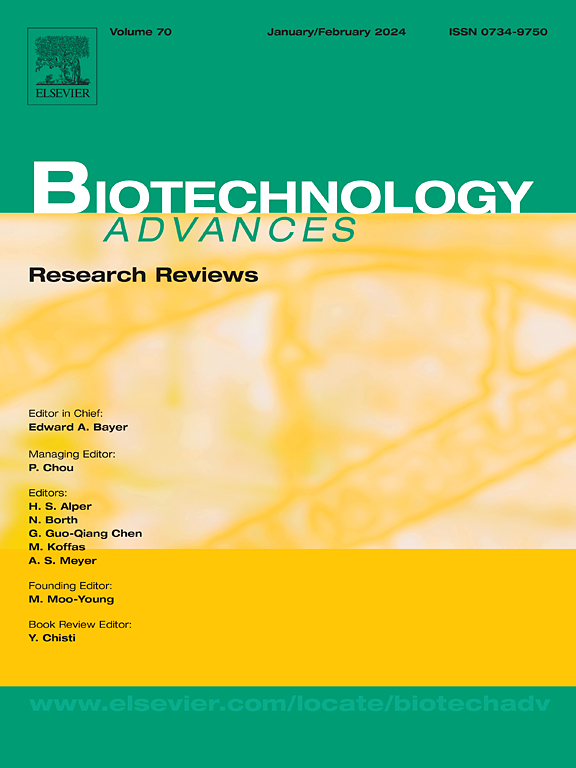Expanding the frontiers of genome engineering: A comprehensive review of CRISPR-associated transposons
IF 12.5
1区 工程技术
Q1 BIOTECHNOLOGY & APPLIED MICROBIOLOGY
引用次数: 0
Abstract
Genome engineering is extensively utilized in diverse scientific disciplines, advancing human welfare and addressing various challenges. Numerous genome engineering tools have been developed to modify genomic sequences. Among these, the CRISPR-Cas system has transformed the field and remains the most commonly employed genome-editing tool. However, the CRISPR-Cas system relies on induced double-strand breaks, with editing efficiency often limited by factors such as cell type and homologous recombination, impeding further progress. CRISPR-associated transposons (CASTs) represent programmable mobile genetic elements. CASTs identified as active were developed as CAST systems, which can perform RNA-guided DNA integration and are featured by high precision, programmability, and kilobase-level payload capacity. Moreover, CAST system allows for precise genome modifications independent of host DNA repair mechanisms, addressing the constraints of conventional CRISPR-Cas systems. It expands the genome engineering toolkit and is poised to become a representative of next-generation genome editing tools. This review thoroughly examines the research progress on CASTs, highlighting the current challenges faced in genome engineering based on CASTs, and offering insights into the ongoing development of this transformative technology.
拓展基因组工程的前沿:CRISPR相关转座子的全面回顾。
基因组工程被广泛应用于不同的科学学科,增进人类福祉,应对各种挑战。目前已开发出许多基因组工程工具来修改基因组序列。其中,CRISPR-Cas 系统改变了这一领域,至今仍是最常用的基因组编辑工具。然而,CRISPR-Cas 系统依赖于诱导双链断裂,其编辑效率往往受到细胞类型和同源重组等因素的限制,阻碍了其进一步发展。CRISPR 相关转座子(CAST)是可编程的移动遗传元件。被鉴定为具有活性的 CAST 被开发为 CAST 系统,它可以执行 RNA 引导的 DNA 整合,具有高精度、可编程和千碱基级有效载荷容量的特点。此外,CAST 系统可以不受宿主 DNA 修复机制的影响,对基因组进行精确修饰,解决了传统 CRISPR-Cas 系统的局限性。它扩展了基因组工程工具包,有望成为下一代基因组编辑工具的代表。这篇综述深入探讨了 CAST 的研究进展,强调了当前基于 CAST 的基因组工程所面临的挑战,并对这一变革性技术的持续发展提出了见解。
本文章由计算机程序翻译,如有差异,请以英文原文为准。
求助全文
约1分钟内获得全文
求助全文
来源期刊

Biotechnology advances
工程技术-生物工程与应用微生物
CiteScore
25.50
自引率
2.50%
发文量
167
审稿时长
37 days
期刊介绍:
Biotechnology Advances is a comprehensive review journal that covers all aspects of the multidisciplinary field of biotechnology. The journal focuses on biotechnology principles and their applications in various industries, agriculture, medicine, environmental concerns, and regulatory issues. It publishes authoritative articles that highlight current developments and future trends in the field of biotechnology. The journal invites submissions of manuscripts that are relevant and appropriate. It targets a wide audience, including scientists, engineers, students, instructors, researchers, practitioners, managers, governments, and other stakeholders in the field. Additionally, special issues are published based on selected presentations from recent relevant conferences in collaboration with the organizations hosting those conferences.
 求助内容:
求助内容: 应助结果提醒方式:
应助结果提醒方式:


